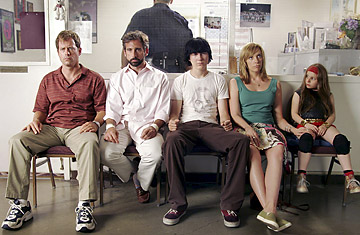
A scene from the film Little Miss Sunshine
In the sweepstakes for this year's Academy Awards, many of the major categories seem closed. Forest Whitaker for Best Actor, Helen Mirren for Best Actress, Jennifer Hudson for Supporting Actress and Eddie Murphy for Supporting Actor — they all won the Golden Globes and many critics' prizes, and they all won again at last night's Screen Actors Guild award. If this quartet doesn't win on Feb. 25, there'll be gasps, calls for a recount and a lot of disappointed bettors in the office Oscar pool.
But there was one surprise at last night's Saggies (or whatever they're called — actually, the Actor, and blechh to that uninspired nickname). It was that the indie comedy Little Miss Sunshine won the Best Ensemble award, beating Babel, Bobby, The Departed and Dreamgirls. Because Crash burst out off the pack last year with a SAG win in the same category, and upset Brokeback Mountain to take the Oscar for Best Picture, Sunshine's victory has to spur it at least the realm of Serious Speculation.
It happens that actors represent the largest craft in the Motion Picture Academy, accounting for about a quarter of its 6,000-or-so voters. So the SAG prize is a good survey not just of their preferences but of the entire membership.
The movie (which I resisted, but I'm speaking as a handicapper here) has other attractive aspects. For one thing, it's a hit: made for just $8 million, the film has earned nearly $60 million at the domestic box office and another $31.6 million abroad. For another, Sunshine boasts a strong mix of American actors (not the motley of U.S., Mexican, Moroccan and Japanese thesps in Babel). Two of the Sunshiners — Alan Arkin, 72, and Abigail Breslin, 10 — were nominated for Supporting Oscars. And now all the actors win the SAG award. Suddenly, they and their film are the little Menschen that could.
BUT...
There's no question that last year's surprise SAG ensemble award to Crash propelled it to the forefront of the Academy membership's consciousness. The prize for Sunshine will make some voters think, perhaps for the first time, "Hey, why not?" But the SAG award is no reliable predictor of Oscar success. The Guild gave it first ensemble prize in 1996, and only five of the 11 winners (Shakespeare in Love, American Beauty, Chicago, The Lord of the Rings: The Return of the King and Crash) have gone on to snag the Oscar for Best Picture. (The films the Actors favored but not the Academy were Apollo 13, The Birdcage, The Full Monty, Traffic, Gosford Park and Sideways.)
Sunshine has a more daunting historical obstacle to hurdle: its directors, Jonathan Dayton and Valerie Faris, were not nominated in their Oscar category. That citation would have been sweet, whatever you think of the movie, since the Academy has nominated a directorial pair only twice before (for West Side Story and the 1978 Heaven Can Wait), and because you could count the number of women nominated for Best Directors on the fingers of a maimed hand. (Three: Lina Wertmuller for Seven Beauties, Jane Campion for The Piano and Sofia Coppola, the only American woman, for Lost in Translation.)
But Dayton and Faris didn't get nominated, and that's a bad sign for Sunshine's Best Picture chances. Oscar, you see, was an auteurist long before the French critics of Cahiers du Cinema proclaimed that the director was the author of his films. The winner of the Best Director statuette has made film named Best Picture 76% of the time — 53 of the 70 possible years — since 1937, when the Academy standardized the category with five nominations.
And only once did the Best Picture Oscar go to a film whose director didn't receive a nomination: in 1990 with Driving Miss Daisy and Bruce Beresford. So the odds against Little Miss Sunshine are 70 to 1. That a lot of Oscar history the indie movie has to buck.
BUT BUT...
Maybe we can find, or invent, a more hopeful trend: the Crisis-Time Pick-Me-Up. In troubled times, Oscar sometimes looks for an antidote (or palliative), and chooses a happy-think movie for Best Picture. It happened during World War II, when the Catholic musical Going My Way won, and in the Vietnam War, with the Dickens musical Oliver, and at the apogee of the Watergate crisis, with The Sting, and just after the Clinton impeachment, when the modest comedy Shakespeare in Love snipered Steven Spielberg's bloody Saving Private Ryan.
We are in another of those historical moments, with grim death gargling at you around every corner and people being slaughtered like sheep. Of course, Academy voters could heed the incendiary Zeitgeist and vote for Babel, a film about international chaos, or Letters from Iwo Jima, depicting the last days of a losing war. The Queen shows a head of state stubbornly resisting the popular will, and The Departed is a chic bloodbath.
Or, surveying this bleak terrain, the Academy membership might turn to the one feel-good movie nominated for Best Picture. Voting for a comedy that celebrates life — eccentric but essentially loving family life — would be an affirmation of what Hollywood has done since its Golden Age: try to make America forget what makes it gloomy, and bring it a little Sunshine.
